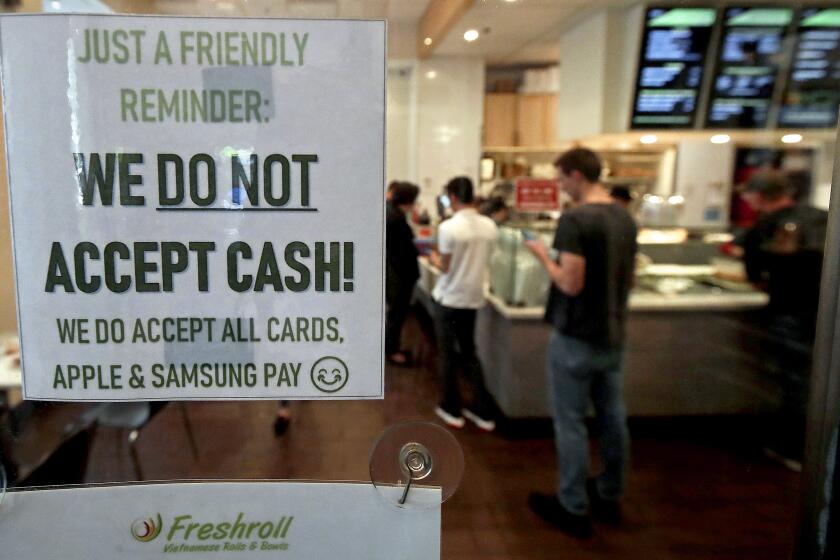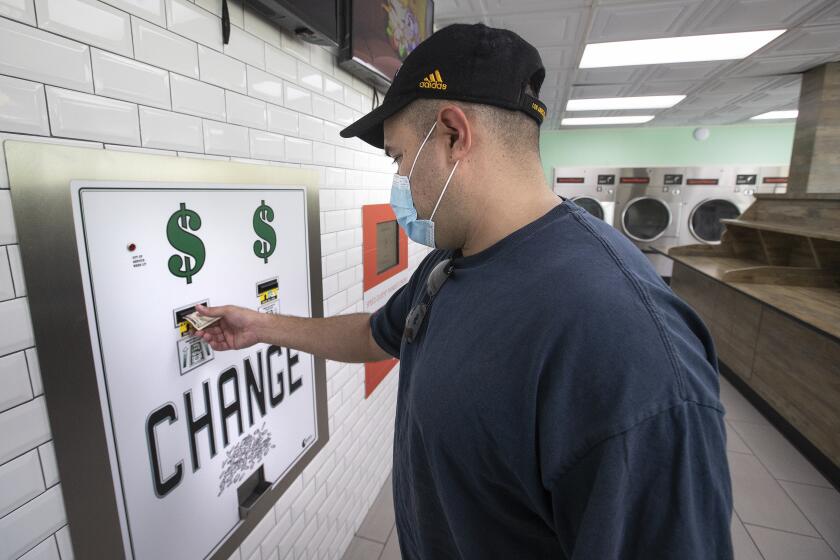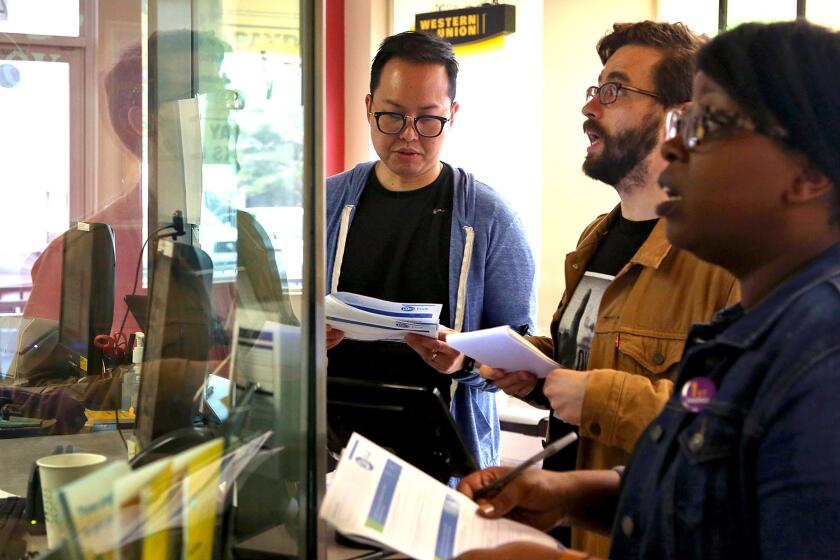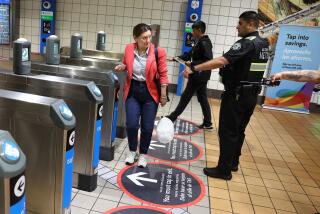L.A. might ban cashless businesses. Here’s what’s at stake
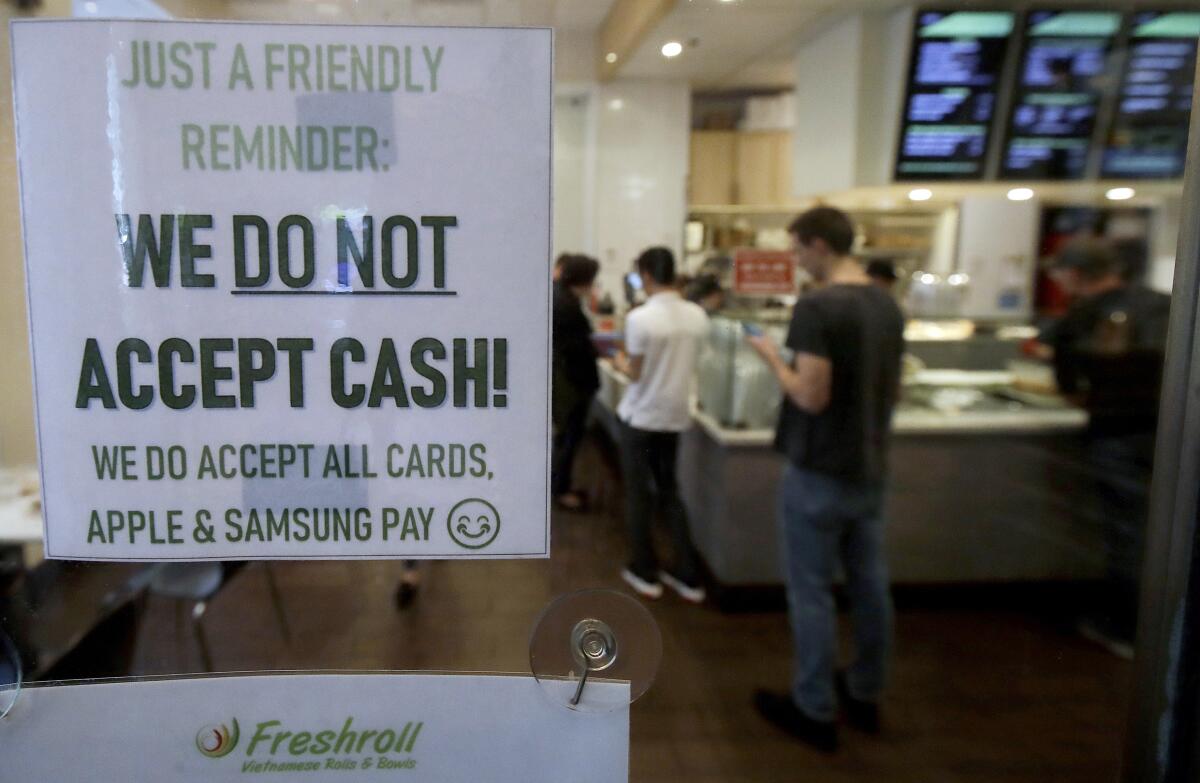
- Share via
A growing number of restaurants and businesses in Los Angeles have decided cash is no longer king. If you can’t pay via credit card or a digital payment app, you can’t pay at all.
That’s a problem, according to City Councilmember Heather Hutt of L.A.’s 10th District. Hutt introduced a motion last week to ban cashless retail businesses in Los Angeles.
“Not accepting cash payment in the marketplace systematically excludes segments of the population that are largely low-income people of color,” the motion said.
Business owners argue that card- or app-only payment systems streamline business operations and limit assets on hand.
But such businesses exclude certain customers and create an issue of equity, Hutt’s proposal says, since unbanked, elderly and low-income residents rely mostly on cash to get by.
As we rush into a “cashless” society to slow the coronavirus, know that there are trade-offs. Businesses could make existing racial inequities worse.
“In order to ensure that all City residents — including those who lack access to other forms of payment — are able to participate in the City’s economic life we should adopt an ordinance that allows them to pay cash for goods and many services,” the motion added.
Here’s what to know about the motion, and the move toward a cashless economy:
Have bans like this been enacted elsewhere?
Yes. Several states and cities have adopted similar rules, including New York City, Philadelphia, Massachusetts, Colorado, New Jersey, Rhode Island and Washington, D.C.
In California, San Francisco and Berkeley already have ordinances requiring that retailers accept cash.
Why is this an accessibility issue?
More Americans than ever are eschewing cold hard cash — 41% say that none of their typical purchases in a week are paid for with cash, according to a 2022 Pew Research Center study. This figure is up from just 29% in 2018.
But many are getting left behind.
“In L.A., we continue to have a problem with access and affordability of basic banking services,” said Bill Maurer, a professor of anthropology at UC Irvine who studies currency and payment technologies.
Studies estimate that 7% of California’s population is unbanked and close to 20% is “underbanked” or have irregular access to banking services.
Many stores are asking customers to use exact change, credit or debit cards. But there are other workarounds.
Underbanked people may have a bank account but also rely on alternative financial services.
“Maybe they can just barely hold on to their bank account and keep their minimum balance, but are constantly getting into situations where they’re going into overdraft and having to pay overdraft fees, and so on,” Maurer explained. “And so while they may have a bank account, they just don’t use it.”
Who relies on cash the most?
Underbanked, unbanked and low-income individuals, who make up distinct demographic segments. Black and Latino households are the populations most likely to be either unbanked or underbanked in Los Angeles and nationally, Hutt said. Unhoused and immigrant populations also often depend on cash transactions.
Additionally, there is a digital barrier to entry for going cashless. This often excludes the elderly, many of whom have not transitioned to digital payments, and young people who have not yet met the age requirements to obtain a credit card.
Why have some establishments stopped allowing cash transactions?
Some businesses in Los Angeles have cited safety concerns about keeping cash on hand, opting for digital-only payments in an effort to discourage break-ins. After several burglaries, the Texas-style taco chain HomeState announced in February that it was no longer accepting cash at its Sherman Oaks location.
Two and a half miles of walking, two failed attempts to cash a $15 check, one toy left behind at a checkout counter and $14 in fees for financial transactions that ordinarily wouldn’t cost me a dime.
“While we’ve always believed that it’s important to accept cash to ensure accessibility for all, it’s our responsibility to take any and all measures to protect our team and our space,” the restaurant posted to its Instagram account in February.
Others consider a cashless system a more efficient way to do business. There are costs associated with cash transport, cash storage, plus the obvious risk of cash loss.
These changes are not always permanent. Fast-casual salad chain Sweetgreen did away with cash in 2016 but reversed course after receiving backlash.
Cash used to be king. What changed?
Some businesses began experimenting with cashless models before 2020, but the COVID-19 pandemic accelerated the trend.
“There’s been a stickiness to the change in behavior toward increased cashless payment” since COVID-19, Maurer said.
Customers and employees alike had concerns that touching bills and coins could lead to virus transmission, and as a result, many consumers were introduced to cashless payment systems for the first time.
Are there other incentives for businesses to discourage cash?
When consumers pay with a credit card, they tend to shop more. And larger purchases can help offset credit card fees from the business end.
“There is data to show that when you offer any cashless means of payment, people will spend more,” Maurer said. “They will feel the pain of being separated from their money less when it’s not physical bank notes.”
Plus, using a digital payment system, such as Square, allows businesses to capture a customer’s email, which creates a seamless path for marketing outreach, leading, merchants hope, to even more dollars spent.
What happens next?
If approved by the City Council, Hutt’s motion would petition the L.A. city attorney to draft an ordinance banning cashless retail businesses.
More to Read
Inside the business of entertainment
The Wide Shot brings you news, analysis and insights on everything from streaming wars to production — and what it all means for the future.
You may occasionally receive promotional content from the Los Angeles Times.
